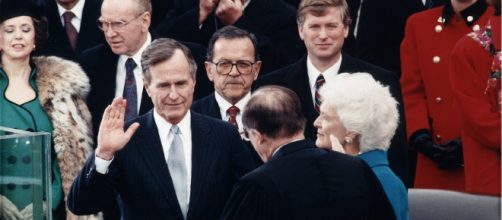George H.W. Bush was the perfect representation of a really good technocrat. The uncharismatic figure that gets things done and shows the most impeccable efficiency without a shiny smile or a narrative that conquer people’s hearts and souls. Basically, we’re talking about one of the least demagogic presidents in U.S. modern history. An undervalued achievement that cannot be considered as a big surprise. After all, he represented one of the most moderate and pragmatic versions of the Republican Party.
George H.W. Bush and the end of the Cold War
As everyone knows, George H.W.
Bush will always be remembered for being the last president that fought in World War II. He will also be remembered as the father of another Republican president, the first vice president to win a presidential election, and a political leader that got buried by an economic recession. However, what the pages of history unfairly forgot was his historic role as a world leader in one of the most turbulent and defining moments ever lived by a US president after the Third Reich’s fall. In case you don’t remember, it was the final days of the Cold War, the end of the Soviet empire, and the dramatic collapse of communism in Eastern Europe.
It was an extremely hectic and delicate period considering the collateral damage and domino effect this situation would have on the world.
There was an incredible avalanche of political changes that the White House needed to address in the fastest and perfect way if it wanted to prevent a new era of chaos and unpredictability. Fortunately, George H.W. Bush managed to seal this moment peacefully, and eventually started what he called “a new world order.”
While it was Ronald Reagan the main character behind the end of the Cold War, George H.W. Bush was the one with the responsibility of being the leader not only of the free world but also of the only superpower left. Far from being in a glamorous position, he had to get his hands dirty and send a powerful message to those who represented a serious threat to the new geopolitical reality.
Unfortunately, his incredible accomplishments on this crucial matter were the elements that everyone decided to forget about him.
George H.W. Bush, Manuel Noriega, and Saddam Hussein
One of those moments was the Gulf War, a delicate situation in the Middle East where George H.W. Bush created a military coalition of more than thirty nations that succeeded in expelling Saddam Hussein from Kuwait in 1991. While he prudently avoided entering Iraq and overthrowing the tyrant, his son would take that move eventually, initiating a controversial war that represented a turning point in the Middle East conflict.
Another crucial moment that most Americans failed to value was the invasion of Panama, which took place two years before the Gulf War.
On this case, it was a well-planned attack against dictator Manuel Noriega, which ended only a couple of days later after he surrendered and was taken to the US were he got tried for drug trafficking. This operation prevented Panama from becoming a narco-state and is basically the main reason why this country is now one of the richest democracies in Latin America.
While George H.W. Bush definitely made some serious mistakes during his presidency, his realpolitik approach and effectiveness on foreign policy was one of the greatest ever shown by a US president. Even when most Americans don’t care too much about this part of US politics, he showed that this country simply cannot be isolated from the world and that playing an active role in the geopolitical table is the mandatory responsibility of every superpower. But with his death, the sunset that we’re now watching is not only the one of the political dynasty but also of a way of doing politics that the US probably won’t find again in decades.


